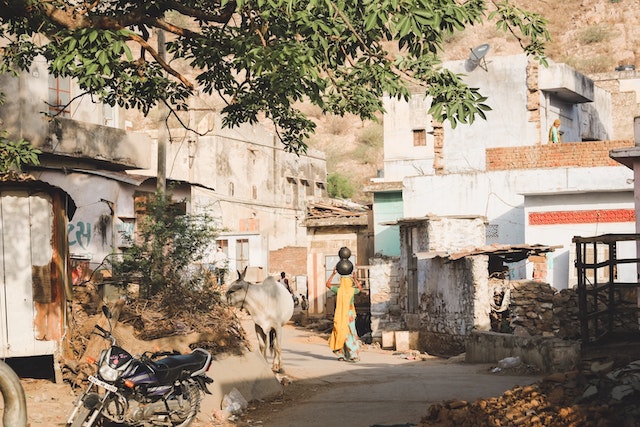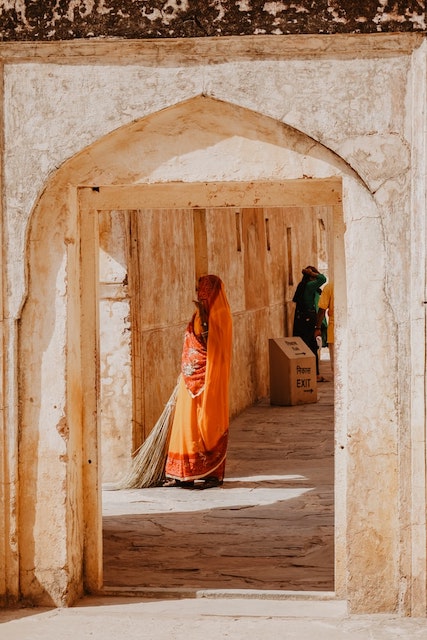Negotiating Gender Equality in India

I graduated college a semester early, so in January 2009 I set off to India to teach English. The American banks had just crashed and, fearing adulthood, I found myself navigating a world unlike any I’d ever seen. I’d already traveled around Africa and Latin America, so wasn’t afraid of a challenge, but the reality of life in India was challenging and exhilarating and full of contradictions. I fell in love with my students and cursed the rickshaw drivers who nearly took me out while crossing the street.
The kindness of strangers overwhelming, yet was always aware that being a woman presented real risks. Nothing exemplified the importance of gender equality more than Valentine’s Day.
Flouting Convention
While my friends in the US were sporting red and pink on February 14, exchanging roses and cardboard cut-out hearts, having dinner with friends or drinking a bottle of wine alone, a young, unmarried couple in Haryana–a northern Indian state–was dragged from a house and beaten in the streets.
It was the Friday night before Valentine’s Day and they’d gone to a friend’s house. The friend left to get food, leaving the couple alone in the flat. A nosy neighbor called the police when she noticed an unmarried couple inside, alone. Instead of enforcing the law as it’s written (that does not prohibit unmarried couples from being alone together), the police enforced their own moral code and ignored the law.
Happy Valentine’s Day.
Happy Valentine’s Day.
“If we find you with somebody of the opposite sex on Valentine’s Day we will hand you over to the police or shave your head,” signs read throughout one region of India.
Who knew Valentine’s Day could be subject to moral policing? From those in uniform and not, from men who consider it their duty to “protect” Indian women from the harms of the influence of western culture.
The signs were posted by the right-wing Hindu group Sri Ram Sena, the same group of men who raided a pub in the southern city of Mangalore in late January that year, attacking women for being there because it was not appropriate for women to be engaging in “such behavior.” As a result, the country was on high alert on that Valentine’s Day, with cities like Delhi putting extra police on the streets to ensure safety. At nice restaurants and bars, extra security was being enforced.

Indians boast of their low divorce rate, as a sign of the success of arranged marriage, yet they often fail to mention the numerous “kitchen accidents.”
Even though these crazies wreaking havoc are in a minority, their voices are, unfortunately, the loudest. Many people do share similar views but express them more moderately. India, despite being the world’s largest democracy, still has a long way to go before women are treated as equal to men. It can be hard to be a woman in India. Even in the wealthiest, most educated families, daughters are still considered a burden. A girl’s dowry, oftentimes, is more important than her intelligence.
While women in the US consider it normal to enjoy dating and marrying men they fall in love with, few Indian women are free to make similar choices. While India’s economy and technology sector is booming, many Indian women are living according to old social rules.
A woman’s worth
In India, every six hours a married woman is beaten or burned to death by her husband or his family. Indians boast of their low divorce rate, as a sign of the success of arranged marriage, yet they often fail to mention the numerous “kitchen accidents.”
When a woman marries, it is typical that she will leave her family and move in with her husband’s family. The caste system prevails partly because people don’t want to marry someone with different customs to their own. As women will live with their husband’s family, marriage is a way of keeping traditions alive, rather than the couple starting their own path together. Because a daughter is usually not responsible for caring for her parents once she marries, many Indian families do not view their daughters as their own: she’s an investment with no return. Many families end up in “dowry debt” after taking out a loan to invest in a newborn girl’s dowry. If subsequent daughters are born, their problems are compounded.
Finding out the sex of a fetus is illegal in India because the rate of female infanticide is so high.
Dowries are technically illegal in India, but almost everyone practices the custom, even if a different name for it is used. Sometimes it makes sense: a family wants to buy their daughter things she will need in her new home: a bed, a refrigerator, kitchen equipment, and so on. Sometimes things get out of control. In the news recently was a case in which a young woman was kicked out of her home after six years of marriage because her dowry was not sufficient.
Finding out the sex of a fetus is illegal in India because the rate of female infanticide is so high. Yet determined people find ways to get around the law. For example, in the northern state of Punjab in 2006, a well was found behind a clinic that contained the remains of about 50 female fetuses.
An image I will never forget is the mother of a bride sobbing at her daughter’s wedding. Not the joyful tears I imagine my parents may cry when I marry, but tears of utmost sorrow. The next day, her daughter was to move to the south of India with her new family, and while the mother of the groom danced into the night to celebrate the marriage of her son and the expansion of her family, the bride’s mother was losing her only daughter.
I counted my blessings.
That Valentine’s Day, I didn’t gripe about being single or about being surrounded by pink and red consumer-driven madness for a fake holiday. Rather, I counted my blessings. The USA still has a very long way to go before gender equality is achieved, but I knew that the following year, back in the USA on Valentine’s Day, whether on a date or celebrating with my girlfriends, I would not have to worry about who was watching.
Remembering Gender Equality on Valentine’s Day top image by Unsplash. This article was originally published on April 30, 2015 on Pink Pangea.








